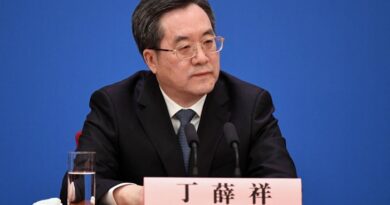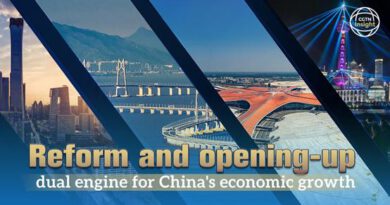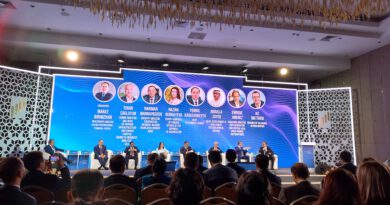Foreign Ministry Spokesperson Mao Ning’s Regular Press Conference on June 6, 2024
CCTV: It’s reported US President Joe Biden in an exclusive interview with Time magazine this week said that the Chinese government provided large amounts of subsidies to flood the US market with electric vehicles and the US is not going to put up with it. What’s China’s response?
Mao Ning: The popularity of Chinese electric vehicles and other new energy products in the global market is the result of persistent tech innovation, well-established industrial and supply chains and full market competition. This is what happens when our comparative advantages provide exactly what the market needs. Our companies competed their way to excellence rather than relied on government subsidies. Last year, China only exported 13,000 electric vehicles to the US. In what way can that be called “flooding” the US market?
Industrial subsidies actually originated in the US and Europe and are widely adopted by countries all over the world. China’s industrial subsidy policy strictly abides by WTO rules and the principles of fairness, transparency and non-discrimination. China never uses WTO prohibited subsidies. The US, on the other hand, is a big subsidizer of its domestic industries. In recent years, the US signed into law the CHIPS and Science Act and the Inflation Reduction Act to directly intervene in the allocation of market resources through direct and indirect subsidies totaling hundreds of billions of US dollars.
Subsidies do not generate competitiveness. Protectionism protects nothing but backwardness with the future as its cost. The US discriminatory practices against Chinese electric vehicles violate WTO rules, destabilize global industrial and supply chains and will eventually undermine the US’s own interests. China urges the US to earnestly abide by market principles and international trade rules, and create a level playing field for companies from all countries. China will firmly defend its lawful rights and interests.
Global Times: Yesterday, NASA Administrator Bill Nelson congratulated China on the success of the Chang’e-6 mission. He said that the two countries cooperated well on Mars exploration and there are plenty of opportunities for deconfliction and cooperation, and welcomed more space dialogue and cooperation with China. What’s your comment?
Mao Ning: Chang’e-6 completed the world’s first-ever mission of collecting samples from the far side of the moon and is on its way home. This is a historic step in humanity’s peaceful use of space. We truly appreciate the extensive attention and recognition it has received from many countries in the world.China is always open toward space exchanges and cooperation with the US. The two sides established mechanisms such as the working group on Earth science and space science cooperation, and the China-US Civil Space Dialogue. At US request, the competent authorities of the two countries established a mechanism to exchange orbit data on each other’s Mars probes to ensure long-term successful mission operation. There are, however, difficulties in China-US space cooperation at the moment, which are caused by US domestic legislation such as the Wolf Amendment that prevent normal exchanges and dialogue between Chinese and US space agencies. If the US truly wants to push forward space exchanges and cooperation with China, it needs to take practical steps to remove these obstacles.
Bloomberg: Taiwan president Lai Ching-te congratulated Indian leader Narendra Modi on his election victory and Modi said he looked forward to closer ties with Taiwan. How does the Ministry respond?Mao Ning: First of all, there is no such thing as “president” of the Taiwan region. As for your question, China opposes all forms of official interactions between the Taiwan authorities and countries having diplomatic relations with China. There is but one China in the world. Taiwan is an inalienable part of the territory of the People’s Republic of China. The one-China principle is a universally recognized norm in international relations and a prevailing consensus in the international community. India has made serious political commitments on this and is supposed to recognize, be alarmed about and resist the Taiwan authorities’ political calculations. China has protested to India about this.Jiji Press: China’s Ministry of Ecology and Environment recently released the Report on the State of the Ecology and Environment in China 2023, which shows that no abnormality was seen in the activity concentration of artificial radionuclides in nearshore marine water and marine organisms.
Does this mean that the Fukushima nuclear “treated” water does not affect the marine environment? Will China consider resuming imports of Japanese seafood in the near future?
Mao Ning: I’d refer you to the Ministry of Ecology and Environment for what’s in its report. Let me say more broadly that China’s position on Japan’s discharge of nuclear-contaminated water from Fukushima into the ocean is consistent and clear. We have taken necessary precaution and response measures to protect our people’s safety and health, and this is justified, lawful and necessary. We hope Japan will take seriously the concerns of the international community, and responsibly handle the nuclear-contaminated water.
PTI: You said China protested to India. Why you have to protest to India about somebody else’s wishing the leader of India?
Mao Ning: India has diplomatic relations with China. China opposes all forms of official interactions between the Taiwan authorities and countries having diplomatic relations with China. This position is very clear and India knows this well.On the one-China principle,
Reuters: First question, Ukraine’s First Deputy Foreign Minister Andriy Sybiha expressed his hope that China will attend the Summit on Peace in Ukraine to be held in Switzerland. Could you share more information with us on his consultation with the Chinese side in Beijing? Second, Palau’s President told Reuters that he expected China to attempt to meddle in a national election at the end of this year. What’s China’s response?
Mao Ning: On your first question, yesterday, China and Ukraine held consultation between our two foreign ministries in Beijing and exchanged views on bilateral relations and the Ukraine crisis. China has released information, which you may refer to. On the Summit on Peace in Ukraine to be held in Switzerland, we have made clear China’s position several times. China will continue to promote talks for peace in our own way and work with other parties to accumulate conditions for the political settlement of the crisis.
On your second question, China follows the principle of non-interference in other countries’ internal affairs. We will not and have no interest in interfering in other countries’ internal affairs. The one-China principle is the prevailing international consensus and a basic norm in international relations. Around the world, 183 countries have already established diplomatic relations with China on the basis of the one-China principle. The very few countries who still maintain so-called “diplomatic ties” with the Taiwan region should come to stand on the right side of history and make a right decision that truly serves their own fundamental and long-term interests.
Bloomberg: Will Wang Yi attend the BRICS meeting in Moscow from June 10 to 11? What message would BRICS have on the Ukraine summit that China has proposed? Do you have information to share on that? What is China’s view on the best forum to reach a solution on ending the war in Ukraine?
Mao Ning: BRICS is an important platform for emerging markets and developing countries to enhance solidarity and cooperation and uphold common interests. We believe that parties at the meeting will have in-depth exchanges of views on international and regional issues of common interest. On the Chinese side’s participation in the meeting, we will release information in due course. Please stay tuned.
On the Ukraine crisis, let me say that there is no simple solution to complex issues. We encourage and support all effort conducive to the peaceful settlement of the Ukraine crisis, and will continue to promote talks for peace in our own way, maintain communication with all parties and jointly accumulate conditions for the political settlement of the Ukraine crisis.


